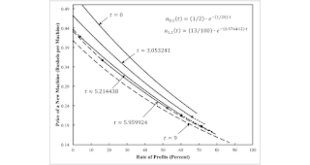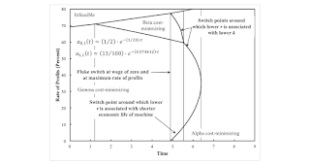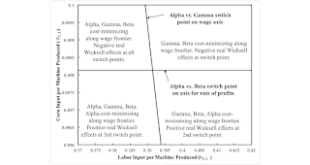These posts demonstrate, in a model of fixed capital, that the cost-minimizing choice of the economic life of a machine need not conform to traditional Austrian and marginalist theory. The cost-minimizing choice of technique around a switch point might associate a shorter economic life of a machine with an increased capital intensity. This counter-intuitive variation of the economic life of a machine is independent of capital reversing and the re-switching of techniques, both of which are...
Read More »Ludwig Von Mises Wrong On Capital Theory
We compare the conditions of two isolated market systems A and B. Both are equal in size and population figures, the state of technological knowledge, and in natural resources. They differ from one another only in the supply of capital goods, this supply being larger in A than in B. This enjoins that in A many processes of production are employed with which the output is greater per unit of input than with those employed in B. In B one cannot consider the adoption of these processes on...
Read More »Ludwig Von Mises Being Stupid
Are those who obtain more income better in some way, perhaps more intelligent than others? Are they luckier? According to Ludwig Von Mises, they are superior in intelligence: "The entrepreneur is the agency that prevents the persistence of a state of production unsuitable to fill the most urgent wants of the consumers in the cheapest way. All people are anxious for the best possible satisfaction of their wants and are in this sense striving after the highest profit they can reap. The...
Read More »An Answer To Ludwig Von Mises
[embedded content]The Start Of This Video Is An Anecdote About George Dantzig1.0 Introduction Ludwig Von Mises popularized the Socialist Calculation Problem and brought it to wider attention. (This problem is also known as the Economic Calculation Problem.) In Von Mises' 1920 paper, he argues rational economic planning is impossible without market prices for capital goods and unproduced resources. Thus, anybody advocating socialism is advocating a system that cannot obtain a high material...
Read More »Some Assertions Of Marx And Some Remarks On The Labor Theory Of Value
1.0 Introduction I have been reading fools in other parts of the Internet. Hence this post. 2.0 Assertions Marx says the following (I am least sure of 6): Both sides to an exchange gain. (Capital, volume 1, chapter 5) Nobody, neither consumers, nor workers, nor investors, nor the managers of firms, make decisions on the grounds of the labor time embodied in commodities. (Capital, volume 1, chapter 1, section4) Surplus value (dividends, interest, rent, etc.), in an ideal competitive...
Read More »Prices In An Example Of The Life Of A Machine
Figure 1: Structural Economic Dynamics of the Price of a New Machine I am not sure that there is any great insight here. But this post depicts the evolution of prices in an example which I have been explaining in two posts. For some parameters, I have found that a shorter economic life of a machine may be associated with a more capital-intensive technique around a switch point. This can occur at both a 'normal' and a 'perverse' switch point. This finding raises difficulties for tradional...
Read More »Technological Progress In Industry And The Life Of A Machine In Agriculture
Figure 1: Variation of Switch Points with Technological Progress in Industry This post is an expansion on this post. Technological progress in industry, in which the machine is produced, can be illustrated in Figure 1 in the previous post by a movement roughly from off the graph to the upper right to below the lower left. More concretely, suppose each of the two non-zero coefficients of production in the machine industry decrease at a constant rate of σ0 and σ1 respectively. The two...
Read More »The Emergence Of Non-Monotonic Variations In The Economic Life Of A Machine
Figure 1: A Part of the Parameter Space1.0 Introduction This post presents a perturbation of an example from Salvatore Baldone. It follows the style of some posts that almost add up to a draft research paper. A widespread view among Austrian-school and mainstream economists is mistaken. Given competitive markets, if the supply of capital were increased, in some sense, the rate of profits would supposedly be driven down. At the level of abstraction here, no distinction exists between the...
Read More »Böhm-Bawerk On The Close Of Marx’s System
1.0 Introduction I have previously quoted authorities disparaging Böhm-Bawerk's pamphlet examining the supposed contradiction between volumes 3 and 1 of Marx's Capital. I refer to Karl Marx and the Close of His System, first published in German, in 1896. Engels brought out volume 3 of Marx's Capital in 1894. Böhm-Bawerk's treatment, although it ultimately misses the point, is important from a historical angle: "...the historical importance of Böhm-Bawerk's criticism of Marx ... should...
Read More »Von Mises Confused About Formal Reasoning, Praxeology
1.0 Introduction In his book, Human Action, Ludwig von Mises defines 'praxeology' as the science of human action. He says that it is a subject of formal reasoning. Human action is conscious action in which the actor attempts to decrease felt uneasiness. 'Catallactics' is a subset of praxeology treating market exchanges. But von Mises is quite confused. 2.0 Does Formal Reasoning Enlarge Our Knowledge? Von Mises does not know. At one point, he says formal reasoning does enlarge our...
Read More » Heterodox
Heterodox



